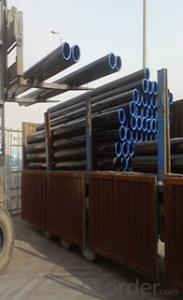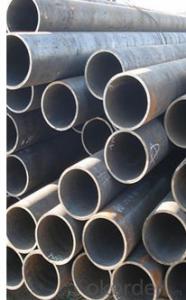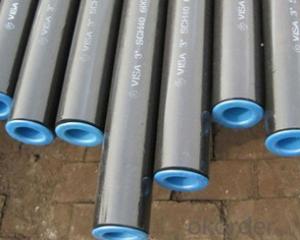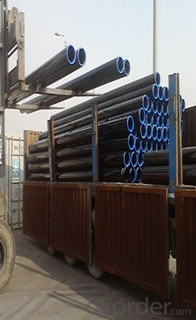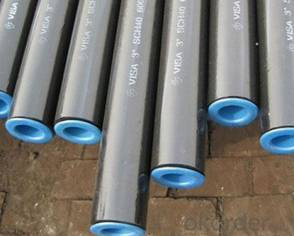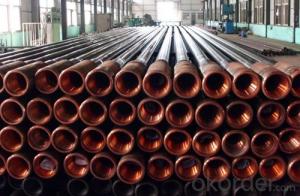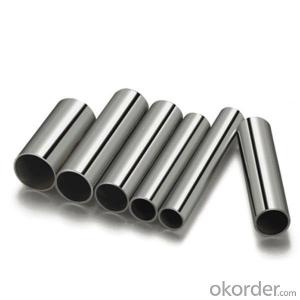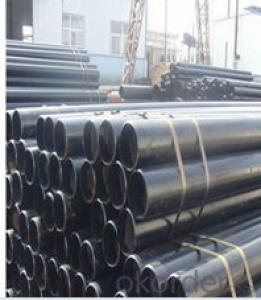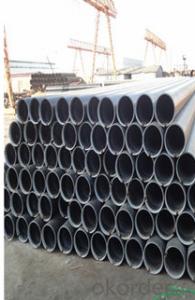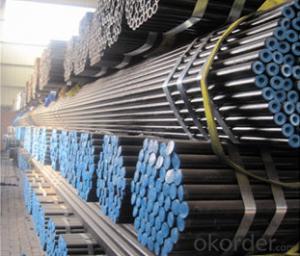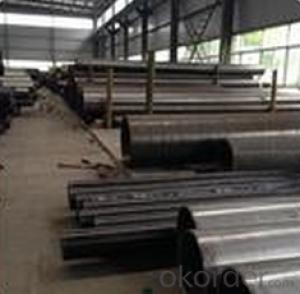High-quality Carbon Seamless Steel Pipe For Boiler 20#CNBM
- Loading Port:
- Qingdao
- Payment Terms:
- TT OR LC
- Min Order Qty:
- 10 pc
- Supply Capability:
- 30 pc/month
OKorder Service Pledge
OKorder Financial Service
You Might Also Like
Quick Details
| Thickness: | 3 - 60 mm | Section Shape: | Round | Outer Diameter: | 21.3 - 1220 mm |
| Secondary Or Not: | Non-secondary | Application: | fluid pipe,boiler pipe, structural pipe, oil/gas/water pipe etc | ||
| Technique: | Hot Rolled | Certification: | ISO9001-2000, ISO14000, ISO18000 , API 5L | Surface Treatment: | Painted, Oiled, galvanized or phosphate etc |
| Special Pipe: | API Pipe | Alloy Or Not: | Is Alloy | Technique:: | Hot rolled or cold rolled |
| Special pipe:: | API/ ASME/thickwall/oil/gas/water pipe | Length:: | 3-12m | Treatment of two ends:: | Beveled end , plain end etc |
| Brand:: | Bai Chuan | Third Party Inspection:: | BV, SGS etc. | Schedule:: | SCH10-SCH160, XS, XXS |
| Other Material:: | 10#, 20#, 16Mn, Q345 etc | Material Type:: | Carbon steel/ Low alloy steel | Producing standard:: | American/Japanese/ German/ Britain/ Chinese standard |
| Grade: | A53(A,B),A106(B,C),A210,API J55,St37,STPG42,A53-A369,API J55-API P110,ST35-ST52 | Standard: | BS EN10296,JIS G3452-2004 |
1. Out Diameter: | 21.3mm-1220mm |
2. Wall Thickness: | 3mm-60mm |
3. Length: | 3m-12m |
4. Producing Standard: |
|
5. Main Material: (Carbon Steel & Low Alloy steel) |
|
6. Special specifications: | Available according to customer’s requirements and quantity. |
7. End Shape: | Beveled end , plain end, varnished, or adding plastic caps to protect the two ends as per customer’s requirements. |
8. Surface treatment: | Painted, Oiled, galvanized, phosphate etc. |
9. Usage: |
|
10. Certificates: | ISO9001-2000, ISO14000, ISO18000, API 5L certificate |
11. Third party inspection: | Welcome you to send a third party inspecting company (BV, SGS etc) to check the quality of our final products. |
12. Pictures: | our producing flow chart, our factory, production line, inspecting equipments, our products are listed below for your reference. |
- Q: How are steel pipes used in mining?
- Steel pipes are widely used in mining operations for various purposes. One of the primary uses of steel pipes in mining is for transporting materials such as water, slurry, and other liquids. These pipes are durable and can withstand the harsh conditions often found in mining environments, making them suitable for the transportation of materials over long distances. Steel pipes are also used for ventilation systems in mines. Proper ventilation is crucial in mining to provide fresh air to workers and remove harmful gases and dust. Steel pipes are used to construct ventilation shafts and ducts that facilitate the flow of air throughout the mine, ensuring a safe working environment for the miners. Additionally, steel pipes are used in the construction of underground tunnels and mine shafts. These pipes provide structural support and reinforcement, helping to prevent collapses and maintain the stability of the mine. Steel pipes are known for their strength and durability, making them an ideal choice for these critical applications in mining. Another application of steel pipes in mining is for the extraction of resources. In some cases, steel pipes are used to create boreholes or wells to access underground deposits of minerals or water. These pipes are inserted into the ground, and various techniques such as drilling or hydraulic fracturing are used to extract the desired resources. Overall, steel pipes play a vital role in the mining industry, serving various purposes such as material transportation, ventilation, structural support, and resource extraction. Their strength, durability, and ability to withstand harsh conditions make them indispensable in mining operations.
- Q: Can steel pipes be used for chemical refineries?
- Yes, steel pipes can be used for chemical refineries. Steel pipes are commonly used in chemical refineries due to their high strength, durability, and resistance to corrosion. The harsh environment of a chemical refinery, which involves exposure to corrosive chemicals and extreme temperatures, requires materials that can withstand these conditions. Steel pipes are able to handle these challenges and are often chosen for their ability to transport various fluids and gases safely and efficiently. Additionally, steel pipes can be welded, which allows for easy installation and maintenance in complex refinery systems. Overall, steel pipes are a suitable choice for chemical refineries due to their robustness, corrosion resistance, and compatibility with the demanding conditions of this industry.
- Q: Can steel pipes be used for conveying sewage sludge?
- Indeed, sewage sludge can be conveyed using steel pipes. Steel pipes possess several properties that render them suitable for this purpose. Firstly, their strength and durability enable them to endure the pressure and weight of sewage sludge without collapsing or fracturing. This is of utmost importance as sewage sludge can be quite heavy and may contain solids that could exert stress on the pipes. Secondly, steel pipes exhibit resistance to corrosion, which is crucial when conveying sewage sludge that frequently contains corrosive components. By utilizing corrosion-resistant steel pipes, one can ensure a prolonged lifespan and minimize the risk of leaks or damage. Moreover, steel pipes can be manufactured in various sizes and diameters, granting flexibility in the design of sewage systems to meet specific requirements. Nonetheless, it is vital to emphasize the necessity of proper maintenance and regular cleaning to prevent sludge buildup and maintain the pipes' efficiency.
- Q: Can steel pipes be used for transporting liquids and gases?
- Yes, steel pipes can be used for transporting both liquids and gases. Steel pipes are known for their durability, strength, and resistance to corrosion, making them suitable for a wide range of applications, including the transportation of fluids and gases. They are commonly used in industries such as oil and gas, water supply, sewage systems, and chemical processing plants. Steel pipes provide a reliable and efficient means of conveying liquids and gases over long distances, ensuring the safe and efficient transportation of these substances.
- Q: What is the bending strength of steel pipes?
- The bending strength of steel pipes refers to the ability of a steel pipe to withstand bending forces without breaking or permanently deforming. The bending strength of steel pipes can vary depending on various factors such as the type and grade of steel, the diameter and thickness of the pipe, and the manufacturing process. Steel pipes are known for their high strength and durability, making them suitable for a wide range of applications. The bending strength of steel pipes is typically expressed in terms of the maximum bending moment or the maximum stress that the pipe can withstand without failure. To determine the bending strength of a steel pipe, engineers and manufacturers use various testing methods such as three-point or four-point bending tests. These tests apply a known force or moment to the pipe and measure its deflection or stress response. The bending strength of steel pipes can also be influenced by the pipe's mechanical properties, including yield strength, tensile strength, and elongation. These properties determine the overall strength and ductility of the steel, which play a vital role in its bending strength. It is important to note that the bending strength can vary depending on the specific application and load conditions. For example, pipes used in structural or load-bearing applications may require higher bending strength compared to pipes used for plumbing or conveyance purposes. In summary, the bending strength of steel pipes is determined by various factors such as the type and grade of steel, diameter and thickness of the pipe, and the manufacturing process. Testing methods and mechanical properties are used to evaluate the bending strength of steel pipes, ensuring their suitability for different applications and load conditions.
- Q: Can steel pipes be used for electrical conduit systems?
- Indeed, electrical conduit systems can utilize steel pipes. Steel pipes have gained popularity for electrical conduit systems owing to their robustness and sturdiness. They possess the ability to safeguard electrical wires and cables against physical harm, moisture, and various environmental elements. Additionally, steel pipes exhibit exceptional fire resistance, rendering them suitable for installations in fire safety-conscious buildings. Nevertheless, it is crucial to recognize that steel pipes necessitate adequate grounding to avert electrical shocks and must conform to local building and electrical regulations.
- Q: How do steel pipes perform in earthquake-prone regions?
- Steel pipes perform well in earthquake-prone regions due to their high strength and ductility. They are capable of flexing and absorbing seismic energy, reducing the risk of catastrophic failure. Additionally, steel pipes can be designed with proper reinforcement to withstand ground movements, making them a reliable choice for infrastructure in earthquake-prone areas.
- Q: Can galvanized pipe be welded with seamless steel tube? What should I do to connect?
- See the galvanized pipe and seamless steel pipe steel that differences in how if the difference is too large then the steel used for two kinds of materials for welding requirements is not the same, do not recommend direct welding, low pressure can be used in high voltage wire, welding on both sides of the same material flange with flange connection.
- Q: How are steel pipes used in construction?
- Steel pipes are commonly used in construction for various purposes such as structural supports, plumbing systems, and underground utility installations. They provide strength, durability, and resistance to corrosion, making them ideal for carrying fluids, gases, and other materials. Additionally, steel pipes can be easily welded, allowing for efficient and secure connections in building frameworks and infrastructure.
- Q: What is the maximum temperature that steel pipes can handle?
- The maximum temperature that steel pipes can handle varies depending on the specific grade and type of steel used. However, in general, steel pipes can withstand high temperatures ranging from 750 to 1200 degrees Celsius (1382 to 2192 degrees Fahrenheit).
Send your message to us
High-quality Carbon Seamless Steel Pipe For Boiler 20#CNBM
- Loading Port:
- Qingdao
- Payment Terms:
- TT OR LC
- Min Order Qty:
- 10 pc
- Supply Capability:
- 30 pc/month
OKorder Service Pledge
OKorder Financial Service
Similar products
Hot products
Hot Searches
Related keywords
